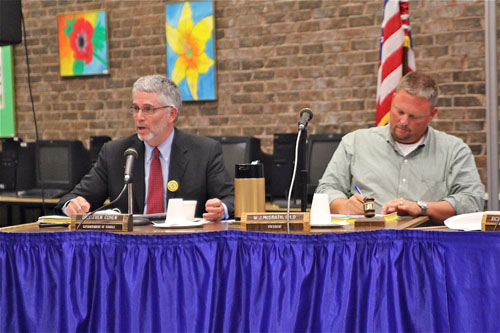SWR officials debate how to choose student for board

Should students decide who will occupy the newly created non-voting spot on the Shoreham-Wading River school board? Or do they need some help from school officials?
And should the student who’s chosen have a minimum GPA or other required credentials?
Those were question debated by board members and administrators at Monday night’s meeting at the high school.
The board ultimately agreed on a sort of combination of high school principal Dan Holtzman’s recommendations for how the student board member should be selected.
Mr. Holtzman got the debate rolling by updating the board on his recommendations Monday night.
He had last recommended that student have a GPA of 85 or higher and that the board develop an interview committee comprising teachers, administrators and a representative of the district’s Civil Service Employees Association. Under this model, the superintendent would make the final choice for the student body representative.
“I had sent a memo later in the summer regarding an outline of the process by which a … student should be selected,” Mr. Holtzman said in his opening remarks.
“These were just some ideas that I had come up with that seemed to give the process some legitimacy,” he said, adding there had been “concern” at that meeting regarding the minimum GPA requirement of 85.
“That was a number I sort of arbitrarily picked just to make the point that there should be some standard of academic standing,” Mr. Holtzman said.
As for the idea of having a student ballot election, which he said Superintendent Steven Cohen suggested, Mr. Holtzman said it would be “doable,” but that he preferred a joint committee of school officials and students to screen and interview candidate before recommending one to the superintendent.
“I understand the thought behind giving the students a say,” Mr. Holtzman said. “I’m not sure, though, that it will serve in the interest of the process.” He added that the choice might become arbitrary if left entirely in students’ hands.
School board member John Zukowski also expressed worry that too many requirements — such as having to be involved in clubs or extracurricular activities — would prevent interested students from participating in the process.
“I have a concern that too many requirements will [prevent] the kid that’s not a member of these clubs, that hasn’t been a joiner in his or her time in high school and this is their opportunity to make their mark in high school,” Mr. Zukowski said. “I would like for those kids to have an opportunity to run for election and get screened by the committee.”
The principal said he agreed with Mr. Zuhowski but added that, at a minimum, the student should have all passing grades and be on grade level with all his or her course work.
“You want the senior to be taking all 12th-grade level courses and not have any failing averages,” he said, adding that if the student body, rather than a committee, is allowed to choose the candidate, there is a chance that many of freshmen, sophomores, juniors and even some seniors will not know who the candidates are.
“It’ll be just like real life,” board member Jack Costas said. “We’re elected public officials, sometimes with a 25, 30 percent turnout. People come out and pull levers and sometimes don’t know who they’re voting for.”
“That doesn’t make it right,” Mr. Holtzman said.
“No,” Mr. Costas said. “But aren’t you trying to show a parallel to the existing [process]? You’re not defining the ideal, heck, [if it were ideal] none of us would be here probably.”
Board president W.J. McGrath, who was not present during Mr. Holtzman’s first presentation, said it seemed to him the process should start with volunteers who met the academic qualifications, and then let the committee come up with a recommendation for the superintendent to present to the board.
“They’re all going to be volunteers,” said Mr. Zuhoski. “Nobody is going to run because they’re forced to run … I want a kid who’s here who is giving us the students’ unbiased view of what we do for them on a daily basis, not filtered through administrators or teachers or parents or student groups that have been formed through a number of years.”
Board members agreed that some level of criteria should be set for students to be able to run for the student board seat, as with other political offices.
During the discussion, Shoreham resident Mike Arena held up his hand and was invited to address the board.
Mr. Arena suggested that three candidates be chosen by the committee of administrators, students and teachers, who are then recommended to the board to be selected as candidates and put out for a final vote by the students.
That way, he said, “Ultimately the students will be making the decision.”
Mr. McGrath said he agreed with Mr. Arena’s comments and, after some discussion, the others members agreed as well. They all agreed the committee would consist of all four class representatives, as well as senior officers who are not running for the actual school board seat.
The student member of the board would not be allowed to sit in closed-door executive sessions.








